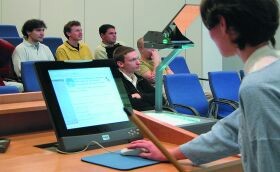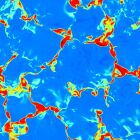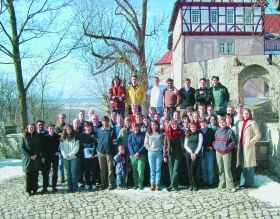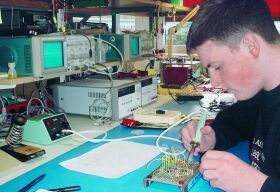
|
Training
|
 |

|
Training
|
 |
 The "International Max Planck Research School on Physical Processes in the Solar System and Beyond" (
The "International Max Planck Research School on Physical Processes in the Solar System and Beyond" (![]() IMPRS) is a collaboration between the Institute and the Physics Departments of the Universities of Göttingen and Braunschweig
which seeks to offer German and foreign students the best possibilities for obtaining a doctorate in the field of solar system physics. The curriculum includes the entire realm of the solar system, from small bodies, through to planets and the Sun. It ensures a broad interdisciplinary and solid scientific education, complemented with courses on computational physics, space technology, and project management.
IMPRS) is a collaboration between the Institute and the Physics Departments of the Universities of Göttingen and Braunschweig
which seeks to offer German and foreign students the best possibilities for obtaining a doctorate in the field of solar system physics. The curriculum includes the entire realm of the solar system, from small bodies, through to planets and the Sun. It ensures a broad interdisciplinary and solid scientific education, complemented with courses on computational physics, space technology, and project management.
Figure 1: Solar System School students attending a seminar talk.

 High-profile space missions and outstanding projects for ground-based instruments, data analysis as well as theoretical and large-scale numerical modelling provide a wide range of research possibilities for PhD students.
High-profile space missions and outstanding projects for ground-based instruments, data analysis as well as theoretical and large-scale numerical modelling provide a wide range of research possibilities for PhD students.
Figure 2 and 3: A picture from a three-dimensional simulation of magneto-convection in the solar photosphere (left: intensity, right: velocity), extracted from the PhD thesis of Alexander Vögler, a former student of the Solar System School and recipient of the Max Planck Society’s Otto Hahn Medal and the Berliner-Ungewitter Prize for outstanding research from the Department of Physics of the University of Göttingen.
 There are regularly about 50 highly qualified students from more than a dozen countries studying at
There are regularly about 50 highly qualified students from more than a dozen countries studying at ![]() IMPRS. A third of them are female and about two thirds from abroad.
IMPRS. A third of them are female and about two thirds from abroad.
Figure 4: Solar System School students participating in a winter school at Burg Bodenstein near Worbis.
 There are on average around 26 trainees at the Institute who receive training in the following professions: industrial machinist, electronics specialist, metal constructor, electrician, office communication, and computer technology. In addition to the trainees, up to 20 pupils and 5 students carry out their practical training in one of the areas of the Institute. The precision tooling and electronics workshops are the most important instruction places. Depending on their future profession, the trainees also work within the workshop, welding, building maintenance divisions and administration. At more advanced stages, they may be involved in work on scientific experiments. Since 1949, the Institute has trained more than 360 young people, and can claim six prizes in federal competitions among young craftspersons.
There are on average around 26 trainees at the Institute who receive training in the following professions: industrial machinist, electronics specialist, metal constructor, electrician, office communication, and computer technology. In addition to the trainees, up to 20 pupils and 5 students carry out their practical training in one of the areas of the Institute. The precision tooling and electronics workshops are the most important instruction places. Depending on their future profession, the trainees also work within the workshop, welding, building maintenance divisions and administration. At more advanced stages, they may be involved in work on scientific experiments. Since 1949, the Institute has trained more than 360 young people, and can claim six prizes in federal competitions among young craftspersons.
Figure 5: Trainees at work.
| © 2006, Max Planck Institute for Solar System Research, Lindau |
webmaster 19-10-2004 |